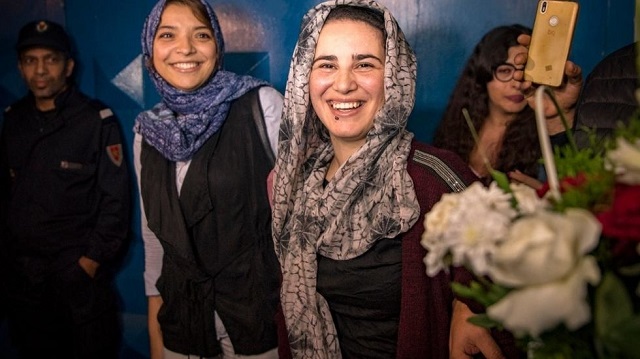Morocco: The Hajar Raissouni case shows press freedom and women’s rights is a shared battle Special Report
New in Ceasefire - Posted on Friday, November 1, 2019 16:24 - 0 Comments
 Two weeks ago, on Wednesday 16th October, not long after the manifesto “Nous sommes hors la loi” — “We are outlaws” — reached 10,000 signatures, King Mohammed VI granted a royal pardon to the journalist Hajar Raissouni, who was then released from prison with her fiancé. The manifesto, launched by the Moroccan film director Sonia Terrab and the author Leila Slimani, had gathered, within its first week, hundreds of signatures from Moroccan citizens and celebrities, including the TV presenter and journalist Ali Baddou.
Two weeks ago, on Wednesday 16th October, not long after the manifesto “Nous sommes hors la loi” — “We are outlaws” — reached 10,000 signatures, King Mohammed VI granted a royal pardon to the journalist Hajar Raissouni, who was then released from prison with her fiancé. The manifesto, launched by the Moroccan film director Sonia Terrab and the author Leila Slimani, had gathered, within its first week, hundreds of signatures from Moroccan citizens and celebrities, including the TV presenter and journalist Ali Baddou.
The manifesto, and subsequent pardon, followed Raissouni’s arrest and trial, which ended in her being sentenced to a year in prison for having an abortion and engaging in premarital sex. Her fiancé was also condemned to a year in prison for ‘illegal’ sex, while her doctor, accused of performing the abortion, was condemned to two years in jail. Raissouni denies the accusations, claiming she only went to the clinic for a gynaecological examination during which she was treated for internal bleeding.
The signatories condemned the “outdated” law forbidding premarital sex and abortion, and declared themselves “outlaws” — for having themselves performed, supported or been through an abortion.
This was a clear echo of the ‘Manifesto of the 343’ — Le manifeste des 343 salopes — in France, a petition published in 1971 for which 343 women, including renowned authors, actors and singers, declared having had an abortion despite the risk of incrimination they could face at the time. That manifesto proved to be a cornerstone in the struggle for the legalisation of abortion in France, and eventually let to the adoption of the Veil law, in 1975, which decriminalised abortion during the first ten weeks of pregnancy.
Religion, individual freedom and freedom of the press
With his royal pardon, King Mohammed VI stepped into a debate that evolved beyond the bounds of Hajar Raissouni’s trial, and turned into a societal debate between two sides of Moroccan society, fought along ideological strands dividing liberalists and traditionalists on the question of individual freedoms.
On one side, the case of Hajar Raissouni triggered protests among the Moroccan population, women especially, against the use of “outdated religious laws” for political purposes. Demands from feminist activists for sexual rights and the decriminalisation of abortion transformed the protests into a debate over sexual and individual freedoms.
This view is shared by a third party: press freedom watchdogs, activists and international observers, who support the view that the regime uses private personal matters in order to silence political opponents, a practice that had been increasingly observed in a country which ranked 135 out of 180 for press freedom on Reporters without Borders’s latest World Press Freedom Index. Raissouni works for one of the few Moroccan independent newspapers still operating, Akhbar Alyaoum, for which she produced a series of reports and interviews about the Hirak uprisings in the Rif region, one of the largest protest movements in the region since the start of the ‘Arab spring’ in 2011.
Traditionalists, on the other hand, have been expressing their concerns over the notion of individual freedom, which, according to the NGO Mawadah, should not be separated from Islamic precepts currently reflected in the Moroccan legal system. Mawadah advocates a “moderate and open-minded” Islam, and considers that sex outside wedlock, adultery, homosexuality or abortion are “immoral practices that are “detrimental to individuals, family and society“.
Royal intervention
By stepping forward into the national debate around the trial, King Mohammed VI has managed to appease all three sides of the confrontation, while also maintaining the status quo.
Officially, the liberation of Hajar Raissouni was made possible by an act of ‘compassion’ from a King concerned about the future and dreams of a young soon-to-be married couple, and was “in accordance with legal and religious prescriptions”. It was also welcomed by the international community as a “huge relief” even though the case remained an “injustice” that should “never have happened in the first place.”
The royal pardon never addressed the Ministry of Justice’s statement, which insisted that the trial had not been politically motivated and maintained that the prosecution’s motivations were strictly on moral grounds. In doing so, the ministry ensured the debate over press freedom would die out while assuring the traditionalists peace of mind over an unquestionable legal system based on Islamic law. Even though the royal pardon had come only after Raissouni’s case had become a potent symbol for the cause of feminism and individual freedom, the discussion within legal institutions on the question of abortion has remained nonexistent.
This has not stopped Hajar Raissouni from expressing hopes that her cause would become an “engine” for the struggles for sexual liberation and reproductive rights in Morocco. Feminist activists, too, are staying positive, reminding everyone that Morocco’s anti-violence law, which criminalises violence against women, was introduced in 2018 but took over five years to be implemented.
What has been clearly established from the Raissouni case, however, along with the monarch’s strong assertion of his position as “King of all Moroccans”, is that press freedoms cannot be improved without progressive changes in women’s rights, including their control over their bodies and sexuality.



Leave a Reply